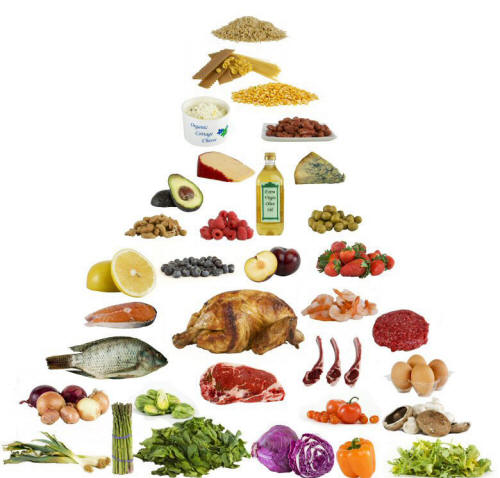|

by Carolanne Wright
March 31, 2016
from
Thrive-Living Website

A few vegetarian and vegan hackles will be raised due to research
demonstrating a low-carb diet may be a better choice for preventing
and healing cancer.
Unfortunately, vegetarian diets tend to
rely heavily on carbohydrates - mainly in the form of grains. When
excessive carbohydrates are consumed, tumor growth is aggravated as
a consequence of increased glucose and insulin levels.
Considering the typical Western diet is
55 percent carbohydrate, it's no wonder cancer rates are through the
roof. The problem is further inflamed by organizations like the
American Cancer Society who advocate atrocious food choices for
cancer patients.
Rife with propaganda and misinformation,
the establishment has kept the myth of healthy high-carbohydrate
diets alive.
Glucose - The
silent killer
Think of glucose as nourishment for cancer - malignant cells thrive
on it.
And since carbohydrates convert to
glucose within the body, carb-heavy diets are problematic for those
wishing to avoid or treat cancer. When ingested in small quantities,
carbohydrates supply energy for both the body and mind.
But if the diet becomes overly laden
with grains, starches and sugars, glucose levels rise and so does
the risk for cancer.
Adding fuel to the fire is the USDA food
pyramid which recommends an astonishing 6-11 servings of grains each
day. On the current "Choose My Plate" USDA program, up to half a
pound of grains daily is considered healthy for the average adult
male.
Incredibly, the American Cancer Society
recommends high-carb foods for cancer patients. Angel food cake,
cookies, bread and muffins are endorsed as nutritious "snack foods"
for those struggling with this devastating disease.
In the end, if chemotherapy doesn't kill
you, the American Cancer Society will.
Think outside
the popular pyramid
Instead of being drawn into the carbohydrate-rich pyramid
propaganda, an alternative is found with a high-quality paleo diet.
Organic grass-fed beef, eggs from
pastured chickens, fish, healthy fats like olive and coconut, an
abundance of berries and vegetables along with nuts and seeds keep
this style of eating healthful.
Even though a paleo diet contains more
carbohydrates than a strict ketogenic plan, it eliminates the carbs
that are the most dangerous: grains, starches and refined sugar.
All three are converted to glucose
rapidly, prompting an insulin spike.
Not only does this strain the pancreas,
but insulin actually encourages tumor growth. A low-carbohydrate
diet forces the body to use fat for fuel instead of sugar. Normal
cells can utilize fat readily, but cancer cells cannot. By severing
the glucose supply to cancerous cells, the disease has a better
chance of being healed.
A study at the British Columbia Cancer Research Center in Canada
found that mice who consumed a high-protein, low-carb diet
experienced slower tumor growth and longer life spans than mice who
were fed a typical Western diet rich in carbohydrates.
The researchers believe these findings
are applicable to humans as well. Gerald Krystal, head of the study,
states,
"…Tumor cells, unlike normal cells,
need significantly more glucose to grow and thrive. Restricting
carbohydrate intake can significantly limit blood glucose and
insulin, a hormone that has been shown in many independent
studies to promote tumor growth in both humans and mice."
Krystal continues,
" …a low-carbohydrate, high-protein
diet has the potential to both boost the ability of the immune
system to kill cancer cells and prevent obesity, which leads to
chronic inflammation and cancer."
Source
Cancer will kill
nearly 8 million people this year. Reduce
your risk and stay informed.
In "The Truth
About Cancer" free online docu-series, over
100 doctors, scientists and cancer survivors
share their secrets to preventing, treating
and beating cancer - naturally.
With cancer
rates at an all-time high, "The Truth About
Cancer" docu-series is a must see! Click
this link to view the series trailer and
register for this free ground-breaking
event.
It will change
how you think about cancer, and potentially
save your life.
Photo
Credit: Karen Struthers
Sources
-
"A Low Carbohydrate, High
Protein Diet Slows Tumor Growth and Prevents Cancer
Initiation" Victor W. Ho, Kelvin Leung, Anderson Hsu, Beryl
Luk, June Lai, Sung Yuan Shen, Andrew l. Minchinton, Dawn
Waterhouse, Marcel B. Bally, Wendy Lin, Brad H. Nelson,
Laura M. Sly, and Gerald Krystal, The Journal of Cancer
Research, The American Journal of Cancer, April 6, 2011.
http://cancerres.aacrjournals.org/content/71/13/4484
-
"Is there a role for
carbohydrate restriction in the treatment and prevention of
cancer?" Rainer J Klement, Ulrike Kammerer, Nutrition &
Metabolism, 2011.
http://www.nutritionandmetabolism.com/content/pdf/1743-7075-8-75.pdf
-
"Paleo Diet prevents Cancer?"
Lila Solnick, Paleo News, July 13, 2011.
http://paleodietnews.com/1268/paleo-diet-prevents-cancer/
-
"The one life-saving low-carb
secret you never hear about" Dr. Allan Spreen, Natural
Health News & Community, July 12, 2011.
http://www.healthiertalk.com/one-life-saving-low-carb-secret-you-never-hear-about-4271
-
USDA MyPlate & Food Pyramid
Resources.
http://fnic.nal.usda.gov/dietary-guidance/myplatefood-pyramid-resources/usda-myplate-food-pyramid-resources
-
"How many grains are needed
daily?" USDA Choose My Plate.
http://www.choosemyplate.gov/food-groups/grains-amount.html#
-
"Converting Carbohydrates to
Triglycerides" National Council on Strength and Fitness.
http://www.ncsf.org/enew/articles/articles-convertingcarbs.aspx
-
"Preventing cancer, Easy as
Paleo!" Jasper Boyschau, Hive Health Media.
http://www.hivehealthmedia.com/preventing-cancer-easy-paleo/
|


